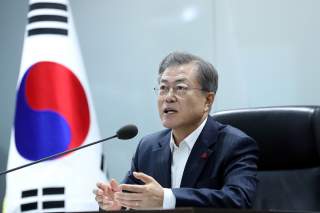North Korea and America’s Second Summit: Here’s What Tim Shorrock Thinks Will Happen
"My optimism is based on what I've been hearing about the US-DPRK talks and South Korea's influence on the negotiating process."
Editor’s Note: Want more ideas on what will happen at the summit? Check out all 76 expert opinions we gathered here.
If all goes well, the upcoming summit between President Donald Trump and Chairman Kim Jong-un should yield a workable interim agreement that will put the United States and the Democratic People’s Republic of Korea (DPRK) further down the road toward normalizing relations and—eventually—denuclearizing the Korean Peninsula.
Such an outcome is essential for North and South Korea to keep the momentum going on their unprecedented moves towards political and economic reconciliation over the last year. But they may not be enough to satisfy the U.S. hawks, including some Democrats, who want total capitulation by the North and a return to the “maximum pressure” campaign of 2017.
The interim steps I mention are likely to include a concession by the DPRK to shut down more nuclear or missile facilities, possibly including the massive Yongbyon complex, and to allow international inspections (beyond reporters) of its actions. As corresponding measures, I predict that the U.S. side will be prepared to lift some sanctions—or offer concrete economic incentives—once the DPRK takes its promised steps. Short of that, it could offer to lift U.S. and UN sanctions that have prevented deeper North-South Korean cooperation. Another acceptable offer might be the opening of liaison offices in both capitals.
My optimism is based on what I’ve been hearing about the U.S.-DPRK talks and South Korea's influence on the negotiating process. An important sign of momentum came on January 19, when Chairman Kim’s representative, Kim Yong Chol, met with President Trump's senior negotiator for North Korea, Stephen Biegun. That session showed that bilateral talks have moved definitively to the diplomatic phase and that hard issues are on the table. Also encouraging was the makeup of the North Korean delegation, which included officials with long experience dealing with the U.S. government and U.S. civil society.
One of them, former DPRK ambassador to Spain Kim Hyok-chol, has been named the equivalent to Birgun and is likely to lead the next round of working-level talks taking place in Panmunjom before the summit is formally announced. Meanwhile, Beigun has been briefing U.S. lawmakers on the negotiations, and seems open to the “step-by-step” process endorsed by South Korean President Moon Jae-in and his government. Trump’s own comments this week that there's a “decent chance of denuclearization” by North Korea also indicates that he understands that the gradual pace preferred by the Koreans is working.
All in all, these preparations on both sides show that U.S.-North Korean engagement is moving in a positive direction.
Tim Shorrock covers North and South Korea for The Nation.
Image: Reuters.


